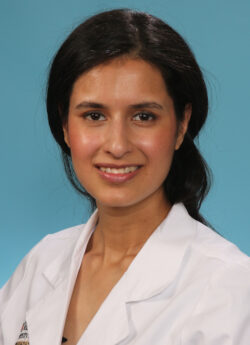
Noor Riaz, MD, a pediatric hospitalist, has been named the 2021-23 Carol B. and Jerome T. Loeb Teaching Fellow at Washington University School of Medicine in St. Louis.
The fellowship program was established in 2004 with a gift from Carol B. and Jerome T. Loeb to advance education. The program also is supported by The Foundation for Barnes-Jewish Hospital. The two-year fellowship provides recipients with extra time to focus on implementing innovative ideas to enhance the education of medical students, residents and fellows.
“The Loebs have had an immeasurable impact on the culture of medical education at Washington University,” said Eva Aagaard, MD, vice chancellor for medical education, the Carol B. and Jerome T. Loeb Professor of Medical Education and senior associate dean for education.
“Their ongoing generosity has helped nurture the medical school’s new curriculum,” said Aagaard, also the interim senior administrator for occupational health. “Overall, the innovative projects that have been selected for Loeb fellowships have contributed greatly to the growth of our students, residents, fellows and faculty, as well as to the field of medicine. I’m excited to see Noor’s project come to fruition.”
Riaz, an assistant professor of pediatrics in the Division of Hospitalist Medicine, will focus on creating a curriculum to help educate doctors in training about the ways that the social and economic environments in which children are born and live can influence their health. Such influences are called social determinants of health.
One of the School of Medicine’s major priorities in educating students is to help them understand how racism and poverty contribute to health disparities. This requires that health-care workers look beyond simply treating an ailment or disease to also consider the social and economic factors that can negatively influence a person’s health. Such social determinants of health have caused disproportionate disease and death for people from disadvantaged communities.
“In St. Louis and elsewhere, health disparities and inequities have resulted in a public health crisis,” Riaz said. “Many of the issues affecting children’s health — such as asthma, obesity, gun violence, premature birth and infant death — are due to social determinants of health. We need to reduce inequalities for our patients while also giving students and residents a transformative learning experience that will impact their future clinical practices in a positive manner.”
Riaz plans to integrate pediatric case studies to teach skills such as verbal and nonverbal techniques aimed at building rapport and trust with patients and parents or guardians. “Ultimately, these sorts of skills will help to reduce the effects of social determinants of health,” she said. “Medical education has made strides in teaching about social determinants of health in the classroom; however, integrated clinical teaching of it declines during clerkships and residency. Our goal is to change that.”
Source: Read Full Article
